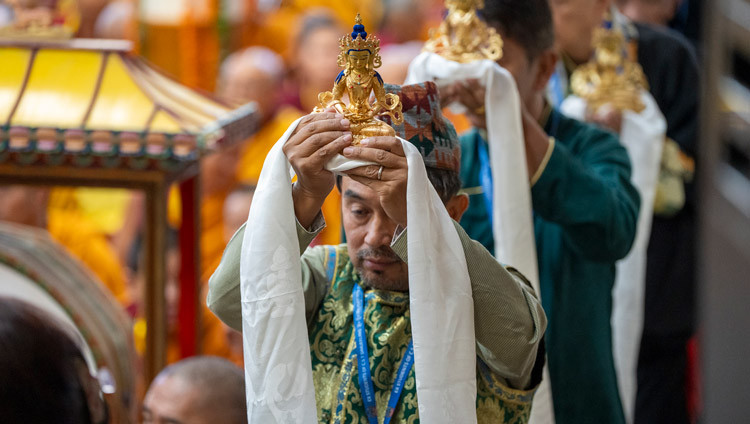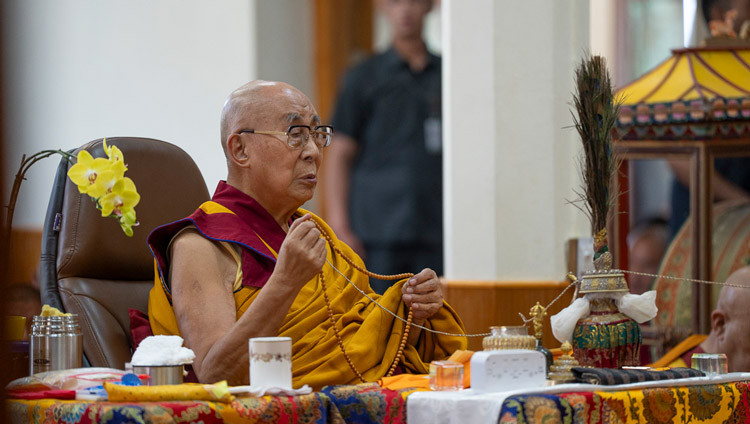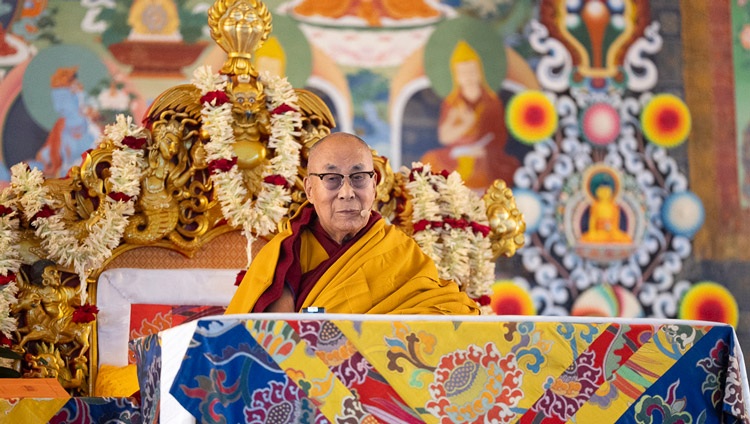Teachings in Bodhgaya – Second Day
Bodhgaya, Bihar, India – People lining the road from the Tibetan Monastery to the Kalachakra Teaching Ground were eager to catch a glimpse of His Holiness the Dalai Lama as he passed this morning. He beamed with joy in return. From the front of the stage he again smiled and waved to the crowd before turning to greet the eminent Lamas seated around the throne.
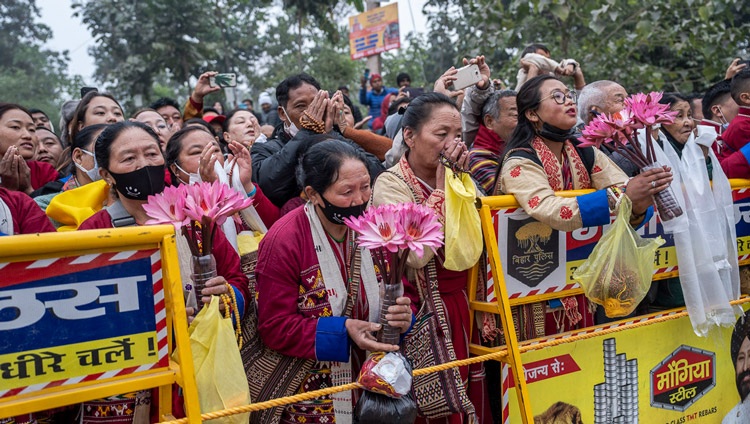
Bodhgaya, Bihar, India – People lining the road from the Tibetan Monastery to the Kalachakra Teaching Ground were eager to catch a glimpse of His Holiness the Dalai Lama as he passed this morning. He beamed with joy in return. From the front of the stage he again smiled and waved to the crowd before turning to greet the eminent Lamas seated around the throne.
As soon as His Holiness was seated, a group of eight Indian girls, students at the Root Institute School here in Bodhgaya, with two of their teachers, sat down before him and delighted the assembly by chanting the ‘Heart Sutra’ in impeccable Sanskrit. The same sutra was then recited again in Tibetan, followed by the verses of salutation from the ‘Ornament for Clear Realization’ and Nagarjuna’s ‘Fundamental Wisdom of the Middle Way’.
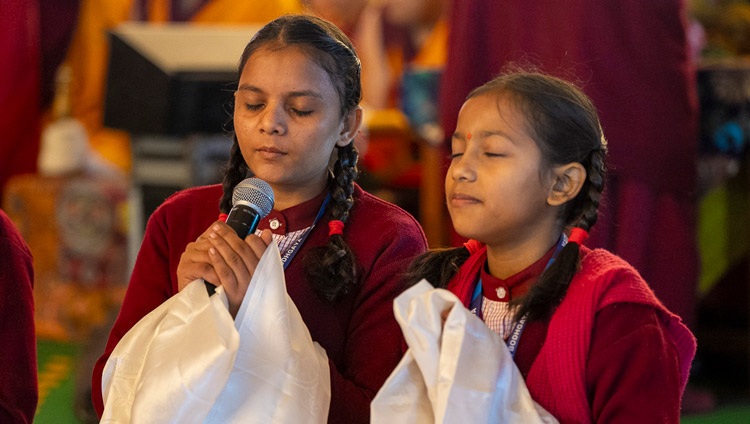
Members of a group of Indian girls, students at the Root Institute School in Bodhgaya, chanting the ‘Heart Sutra’ in Sanskrit at the start of the second day of His Holiness the Dalai Lama’s teachings at the Kalachakra Ground in Bodhgaya, Bihar, India on December 30, 2023. Photo by Tenzin Choejor
“Today, in this very special place, Vajra-asana, the seat of enlightenment,” His Holiness observed, “people have gathered from many different countries and have the opportunity to make prayers. All sentient beings are the same in not wanting the slightest suffering, and, especially in the case of human beings, seeking joy.
“As human beings we have the ability to look for reliable methods to overcome suffering and generate happiness. However, far too often, we look at things from a narrow point of view and only end up making ourselves unhappy. We lose our way in pursuit of short-term gratification.
“No other creatures are quite like human beings, who, although intelligent, create suffering for themselves and others. We’ve seen the horrors of the first and second world wars and yet there are those who would have us prepare for the third. We pour energy and resources into constructing sophisticated weapons whose only purpose is destruction.
“We need to be aware of the mistakes we have made and engage instead in practices that will create happiness and reduce suffering for everyone. We must work to avert war and forgo the use of weapons. We should no longer think in terms of complete victory for ourselves and the abject defeat of our adversaries. We must avoid thinking of our fellow human beings in terms of ‘us’ and ‘them’ and seek to live in peace and harmony with each other.
His Holiness the Dalai Lama addressing the crowd gathered at the Kalachakra Ground to attend the second day of teachings in Bodhgaya, Bihar, India on December 30, 2023. Photo by Tenzin Choejor“The real root of happiness is having a compassionate mind. If we just let ourselves be flung here and there by anger and hatred, there’ll be no peace in the world. But if we cultivate a warm-hearted attitude towards others there will be hope.
“We had no weapons in our hands when we were born. Indeed, at that time we were nurtured by our mother’s love and affection. We would do well to keep this experience alive as we grow up.
“It’s both sad and unfortunate that so many people seem set on killing each other. How much better it would be if they focussed instead on creating a loving atmosphere around them. Because we want to be happy and not to suffer, we should work to cultivate ‘karuna’, compassion, within. Then we’ll contribute to peace in the world. If we have love and compassion in our hearts, we’ll be on good terms with those around us. We have a responsibility to create peace in the world. This means doing our best to build peace within and without.”
His Holiness noted that there are a number of different religions in the world, but all convey a common message about the value of cultivating love and compassion. This leads to an appreciation of the oneness of humanity. He observed that we make prayers that all sentient beings be happy and avoid suffering, but words alone are not enough. We have to take practical steps to help each other.
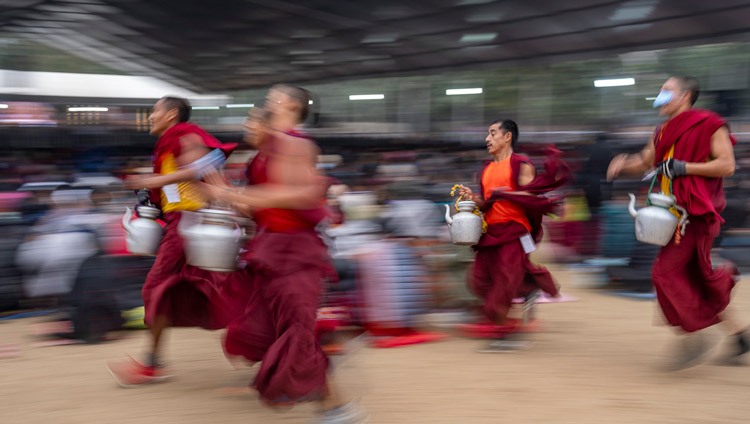
Volunteer monks racing to serve tea to the crowd of over 50,000 attending the second day of His Holiness the Dalai Lama’s teachings at the Kalachakra Ground in Bodhgaya, Bihar, India on December 30, 2023. Photo by Tenzin Choejor
He remarked that yesterday’s text dealt primarily with emptiness. In that context, all sentient beings are the same in that their minds are empty of inherent existence. Applying the insights of yesterday’s teaching we can overcome the attachment, anger and hatred that causes division among us. The more loving and compassionate we are, the happier we’ll be. If we have love and compassion in our hearts, we’ll be able to die in peace.
“Today,” His Holiness announced, “we’ll cultivate the all-encompassing yoga mind. Most of us here are Buddhists, who pray to reach Buddhahood. The first syllable of the Tibetan word for Buddha—Sang—indicates that he has overcome all defilements. The second syllable—gyé—refers to his having acquired all qualities. So, our goal is to reduce the defilements in our minds and acquire all good qualities, thinking not only of ourselves, but of all sentient beings. The more we focus on the welfare of others, the more positive qualities we accrue.”
When it came to cultivating the all-encompassing yoga mind His Holiness advised his listeners to focus on the thought of bringing benefit to all sentient beings, infinite as the expanse of space, aspiring to lead them all to the state of Buddhahood. This amounts to generating conventional bodhichitta. His Holiness prompted the disciples to visualize this mind transforming into a moon disk at their hearts.
Next, His Holiness reminded them that although things appear to exist independently and objectively, they are actually dependent on other factors and exist as merely designated. He added that we too are all dependently arisen and have no objective status. Even the Buddha only exists in terms of designation.
His Holiness advised his listeners to imagine this thought of ultimate bodhichitta, the insight that all phenomena lack of inherent existence, arising in the form of a white, five-spoked vajra standing upright on the moon disk they had already imagined at their hearts. He asked them to repeat: Om sarva yogacitta utpatayami Then, to stabilize their minds and make the mind of all-encompassing yoga firm he asked them to recite: Om surate samaya satvam ho siddhi vajra yatha sukham.
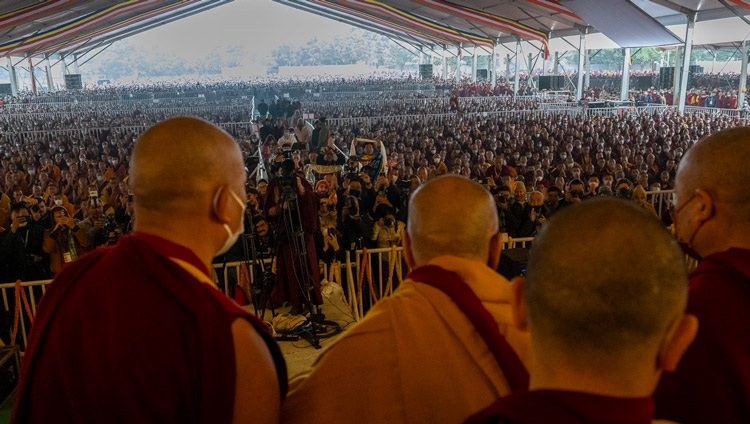
His Holiness the Dalai Lama waving to the crowd of at the conclusion of the second day of teachings at the Kalachakra Ground in Bodhgaya, Bihar, India on December 30, 2023. Photo by Ven Zamling Norbu
His Holiness declared that this ceremony was sufficient to entail the granting of the Bodhisattva Vow. He stated that what is most important is that disciples make themselves thoroughly familiar with the awakening mind of bodhichitta and the wisdom understanding emptiness.
“What I’ve learned about these two practices I’ve reflected and meditated on over many years. And I’ve seen the impact they have had on my mind. If you also cultivate these practices well, you’ll be able to embark on the path to enlightenment in this life.
“It’s because I recall emptiness and cultivate the awakening mind of bodhichitta from the moment I wake every morning that I am relaxed and at ease. Please keep this in mind. That’s all. Tashi delek.”



